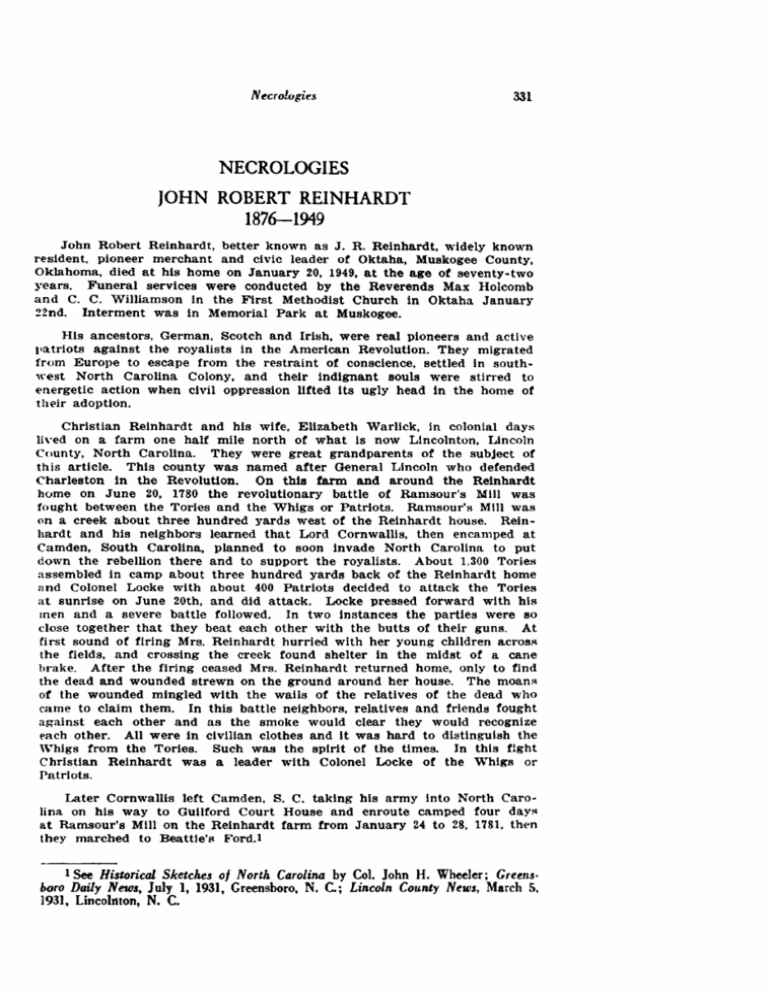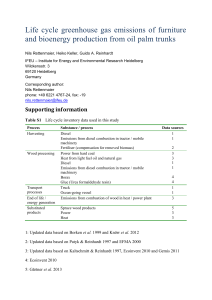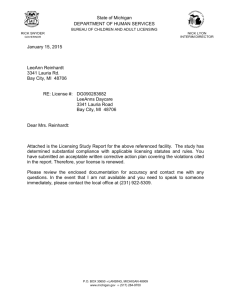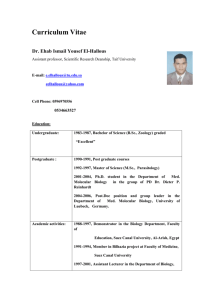1876- I949 - Oklahoma State University - Library
advertisement

Necrologies NECROLOGIES JOHN ROBERT REINHARDT 1876- I949 John Robert Reinhardt, better known as J. R. Reinhardt, widely known resident, pioneer merchant and civic leader of Oktaha, Muskogee County, Oklahoma, died a t his home on January 20, 1949, a t the age of seventy-two years. Funeral services were conducted by the Reverends Max Holcomb and C. C. Williamson in the First Methodist Church in Oktahn January 2 n d . Interment was in Memorial Park a t Muskogee. His ancestors, German, Scotch and Irish, were real pioneers and active patriots against the royalists in the American Revolution. They migrated from Europe to escape from the restraint of conscience. settled in south\vest North Carolina Colony, and their indignant souls were stirred to energetic action when civil oppression lifted its ugly head in the home of their adoption. Christian Reinhardt and his wife. Elizabeth Warlick, in colonial days lived on a farm one half mile north of what is now Lincolnton. Lincoln County, North Carolina. They were great grandparents of the subject of this article. This county was named after General Lincoln who defended Charleston in the Revolution. On this farm and around the Reinhardt home on June 20, 1780 the revolutionary battle of Ramsour's Mill was fought between the Tories and the Whigs or Patriots. Ramsour's Mi11 was on a creek about three hundred yards west of the Reinhardt house. Reinhardt and his neighbors learned that Lord Cornwallis, then encamped a t Camden, South Carolina, planned to soon invade North Carolina to put down the rebellion there and to support the royalists. About 1,300 Tories :tssembled in camp about three hundred yards back of the Reinhardt home and Colonel Locke with about 400 Patriots decided to attack the Tories a t sunrise on June 20th, and did attack. Locke pressed forward with his men and a severe battle followed. In two instances the parties were so close together that they beat each other with the butts of their guns. At first sound of firing Mrs. Reinhardt hurried with her young children across the fields, and crossing the creek found shelter in the midst of a cane hrake. After the firing ceased Mrs. Reinhardt returned home. only to find the dead and wounded strewn on the ground around her house. The moans of the wounded mingled with the wails of the relatives of the dead who came to claim them. In this battle neighbors, relatives and friends fought against each other and a s the smoke would clear they would recognize each other. All were in civilian clothes and it was hard to distinguish the Whigs from the Tories. Such was the spirit of the times. In this fight Christian Reinhardt waa a leader with Colonel Locke of the Whigs or Patriots. Later Cornwallis left Camden, S. C. taking his army into North Carolina on his way to Guilford Court House and enroute camped four days a t Ramsour's Mill on the Reinhardt farm from January 24 to 28, 1781. then they marched to Beattie's Ford.1 1See Historical Sketches of North Carolina by Col. John H. Wheeler; Greensboro Daily News, July 1, 1931, Greensboro, N. C; Lincoln County News, March 5, 1931, Lincolfiton, N. C. 332 Cbonidcs oj Oklahoma Michael Reinhardt was born a t Idncolnton, N. C. in 1790, the son of Christian Reinhardt a n d Elizabeth Warlick. He was a Captain under General Andrew Jackson fn the W a r 02 1812. afterwards a member of thv North Carolina State Senate 1827. 1828, 1836 and 1888, a n extensive farmer and owner of a flour mill. In 1846 h e moved t o Marshall County, Mississippi. and in 1855 settled in Prairie County, Arkansas. Mary Moore born in New York 1795, a teacher in a glrfs' college at Rochester. New York, came south to teach school and married Michael Reinhardt a t Lincolnton. North Carolina. Upon t h e death of Mary Moore. Michael Reinhardt married Maria Allyn. born at New London. Connecticut. 1790. who also came south tu teach school at Uncolnton. Maria Allyn was a sister of Captain Francis I. Allyn. of New London. Connecticut, who a t his expense brought to America in 1824 from La Harve, France. Le Marquis de Lalayette. his son. George Wsshlngton Lafayette, and the secretary. M. Auguste Lavasseur. The Lafayettea and Captain Allyn were fond friends a l t e r 3 Michael Reinhardt a n d Mary Moore had the following children : Adolphu ; Wallace. Daniel, Augustus Michael. and Lizzie. Michael Reinhardt an.: Maria Allyn had children: Maria and John D. Auguatus Michael Reinhardt, the son of Michael Reinhardt and Mary Moore. w a s born a t Uncolnton. North Carolina in 1825, moved to Mlssisnippi in 1846, and settled in Hickory Plains, Prairie County, Arkansas i n 1848. H e w a s a public surveyor, slave owner and farmed extensively. With the coming of the war, he heard the call of the South, entered the Confederate Army..became a Captain in Turnbull's Batallion. under General Morgan a n d saw service at the battles of Lookout Mountain, Chickamauga. and other points in Tennessee, Mississippi and Arkansas. Augustus M. Reinhardt married Mary Rebecca Harshaw a t Hickory Plains a n d they had the following children: Annie Reinhardt Perkins of Hattiesburg. Miasissippi; Henry Relnhardt of Wetumka, Oklahoma; Mamie Reinhardt Conway, a teacher in Draughon's Business College. other colleges, and Henry Kendall College a t Muskogee. Indian Territory, now Tulsa University i: t Tulsa. Oklahomn: Emmett Reinhardt, merchant a t Des A r c . Arkansas: Clara Relnhardt Brady. teacher of history a t Henry Kendall College a t Muskogee. Indian Territory. now Tulsa University; Sallie Reinhardt, a teacher in Indian schools in Indian Territory. Mattie R. Reid (Mrs. John Reid), Stillwater. Oklahoma; William Reinhardt. a land owner and cattle m a n of Hlckory Plains. Arkansas; John Robert Reinhardt, of Oktaha. Oklahoma. t h e subject of this article. All are dead now except Clam R. Brady. living at E l Paso, Texas. John Robert Reinhardt was born March 25. 1876, on his father's plantatfoh at Hickory Plains. Arkanras. On this farm he grew to manhood. learned the value of labor and hard work. attended the schools of that community, a n d like many men of his day his first position was as school teacher in a school not far from where he lived. On March 25. 1902 he married Cornelia Ellen Dunkum a t the Dunkum home near Hickory Plain-. As a small boy and a young man one of his running mates was Joseph T. Robinson. aftetwards IT. S. Senator and candidate for Vice President of t h e United States. In 1906, Mr. Reinhardt moved to Muskogee County. Oklahoma. a n d three years later settled in Oktaha. Oklahoma, where for I?-fine years h e enaaeed in the mercantile business under the firm name of Oktnha Tradina Company, a partnership comrmed of John C. Brads and F. R. Bmdv and himself. Aftcr some years he purchased the I n t e r e ~ tof his partners in the business and as sole owner conducted the business under 2 See Lfayette Letters, by Edward E. Dde, 1925; Arkansas Gazette of Nov. 23. 1947; The Daily Oklahoman of April 4 1926. the same name until his death on January 20. 1949. He owned and operated several farms in Muskogee County and engaged extensively in the cattle and livestock business. Following a true American tradition, his means a t first small his business was small, but under his sensible management his business expanded immensely so that at his death his landed estate was extensive and his name and store were favorably known and spoken of at home and far away. Mrs. Cornelia Ellen Reinhardt, his widow, and two charming daughters, Bida Reinhardt York and Rebecca Reinhardt Priest survive him. The widow and Mrs. York live in Muskogec. Oklahoma, and Mrs. Priest teaches school and lives in Tahlequah. Oklahoma. Mr. Reinhardt was Mayor of Oktaha, member of the School Board and Vice President of Muskogee County Taxpayers League for some years and otherwise never sought political favor. He preferred to discharge his obligations to his country rather by obeying than the making of its laws. His manners were frank and candid; and the more intimately he was known the better was he beloved. Long will he be remembered a s a true man, a faithful friend and an upright citizen, conscientious in the discharge of all of his obligations and in the performance of his duties. He was a Steward in the Methodist Church and died as he had lived, a true Christian. placing firm faith in the promises of the scriptures. -By William B. Moore Muskogee, Oklahoma JOHN LEAF SPRINGSTON 1845-1929 John Leaf Springston was the son of Anderson Springston and Sallie Eliot, both of part Cherokee and white blood. Anderson Springston was horn at Gunter's Landing in Tennessee and after his removal to the Indian Territory practiced law in the Cherokee courts of Delaware and Tahlequah districts. John L. Springston was born in October, 1845, near the locality known as Lynch's Mill. a few miles east of the site of the present Spavinaw dam. He received his education in the common schools of Delaware District. As a child he knew only the Cherokee language, but soon learned to speak English fluently. At the early age of fifteen he was employed a s clerk and court reporter in Saline District but, ambitious to secure an education. he made plans to enter Shurtleff College a t Alton, Illinois. However, before these plans could be realized the Civil War broke out and he volunteered for service in the Indian Home Guards. commanded by Colonel William A. Phillips. In this organization he served in Company I, commanded by Captain Whitecatcher. The service of this company was limited to an area not more than one hundred miles from the Spavinaw vicinity. With his company he saw service in the battles of Cabin Creek near VInita and Honey Springs south of Muskogee. Because of his education and natural qualifications, Springston was called upon to perform valuable clerical duties and to act a s interpreter in connection with the operation of his regiment. After his service In the war Springston mas empIoyed a s translator and associate editor of the Cherokee Advocate, published weekly at Tahlequah. where he was associated with William P. Boudinot, William P. Ross and other talented Cherokees whose influence did much to develop the character and education of 334 Clironidcs of Oklahoma the young Springston, It was only natural that in this capacity he should have coma to the att6ntion of the Cherokee officisla and that he should y the Cherokee chief and offihave advanced t o the podtion of ~ e ~ r e t a rto cial translator under that executive. During those days, he later recalled, he waa personally engaged in every transaction between the Cherokee Nation and the fsderal authorities in Washington. In the early seventies he served an sheriff of Saline county and a few years later as clerk of the Cherokee senate. While he retired from the Advocute staff in 1886, he continued his interest in newspaper work and in 1894 he was the editor of the Tahleqwh MOr?&ing8un, which expired when he terminated his connection with it in order to aasume the important position of interpreter in the United States court a t Fort Smith presided over by Judge Isaac C. Parker. For a number of years this court had exclusive jurisdiction over criminal matters arising in the Indian Territory, and a s many parties to these cases, together with their witnesses, mere Cherokees, it was important to both the government and litigants that a n interpreter of the highest qualifications be a member of the staff of that court. The qualifications and character of young Springston having become widely known, it was only natural that Judge Parker should have selected Springston as his official interpreter. Here he continued a n eventful and useful career. During the first two years of Bushyhead's administration as chief of the Cherokees Springston wm clerk of the senate and official interpreter during the entire administration. IIe also acted a s interpreter for a special commission on citizenship. After the war he continued to practice law and devoted much time to attending to pension claims of Indians who had served in the Civil W a r and their heirs. Mr. Springston was first married in 1867 to Sarah Eliza Moseley, granddaughter of George Flelds, by whom he had two daughters. Ruth and Elizabeth. By a second marriage he had two daughters, Viola Dacre and Wenona. In 1886 he married Miss Alice Caroline Gray, daughter of Adolphus Gray, a white man of Raleigh, North Carolina. by whom he had one son, W. P. Boudinot Springston. - For some years Mr. Springston lived in Sallisaw, where he was known as a Useful and public spirited citben. Here he constructed a building near the Kansas City Southern Railroad station that was known a s the Springeton House. Later this house was occupied by the first Sallisaw public school. Afterwards he removed to Vian. where he became one of the principal builders of the little town. From here he removed to Owassa and still later to Tulsa to spend his declining years with his son. William B. SpringSton, with whom he was living a t the time of his death. Mr. Springston was described as a handsome man six feet tall. weighing 286 pounds and a splendid specimen of his race. He had much charm of addreas and was capable of strongly impressing the juries before whom he practiced. In his late years Mr. Springaton suffered from a heart ailment which caused his death on the sixth day of January, 1929, a t the age of eightyfour years. Records of historical interest and value kept by Mr. Springston a t Fort Gibson during the Civil War. connected with the service of his regiment were recently presented to the Oklahoma Historical Society by his son. Mr. W. B. Springston. By Orant Foreman. M ~ ~ ~ omdomcr C C ,







